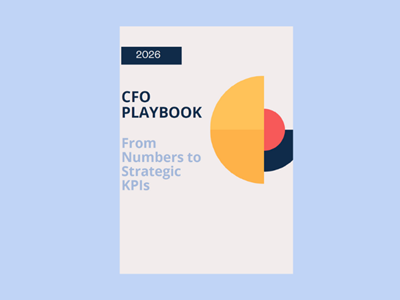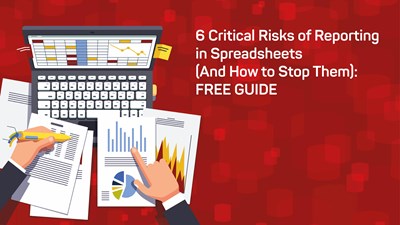%20(Beskuren%202).png?TS=638906891051102749)
Enterprise Performance Management: Boosting Efficiency in Financial Planning
When economic shifts occur overnight and the competition is relentless, finance teams are put under great pressure to deliver fast and accurate insights. Spreadsheets alone simply cannot keep up. The only thing that success hinges on now is the ability to unify planning, forecasting and reporting. However, this should all be done with speed, transparency and confidence.
In such cases, enterprise performance management (EPM) is a game-changer for organisations seeking to gain a competitive edge. It is far more than just another software tool. EPM gives businesses the tools to transform mountains of data into crisp, actionable business intelligence. It breaks down silos, allowing for smarter decisions, while at the same time, it puts finance at the heart of strategy.
Below, we go into detail about EPM and its key benefits for enterprises.
What Is Enterprise Performance Management?
EPM is a strategic framework comprising processes, methodologies and technology. It is a helpful tool for organisations that want to align business strategy with execution. At its core, EPM integrates financial and operational data, giving business leaders the freedom to move from fragmented planning cycles to a unified, agile approach.
EPM connects strategy with day-to-day operations, which means teams can plan, monitor and adapt swiftly, even during times of unexpected market disruption.
Main Features To Look for in EPMs
When evaluating EPM solutions, organisations should look for the following features:
Automated data consolidation to eliminate manual manipulation and ensure data accuracy
Unified dashboards to bring all performance data into one easy-to-read location
Insights from artificial intelligence to uncover trends, risks and opportunities
Scenario planning to predict and prepare for the best, worst and most likely case scenarios with ease
Real-time collaboration that allows multiple departments to edit, update and analyse data at the same time
Flexible integration where they can work seamlessly with the existing business intelligence and ERP systems.
Key Benefits of EPM for Finance
The finance sector has seen numerous benefits from implementing EPM. Let's see what some of them are:
Streamlined Planning and Budgeting
Traditional budgeting often involves late nights, spreadsheet risks and lengthy cycles. But there is a way to transform this, and EPM is the answer. EPM solutions transform the traditional way into a collaborative and transparent process. Finance teams can now create driver-based plans, run what-if scenarios and adapt forecasts in real-time. This allows growing businesses to use this dynamic approach and react quickly to changing conditions.
Enhanced Reporting and Real-Time Analytics
One of the EMP's most powerful features is its capacity for real-time data analysis and reporting. Rather than relying on statistics, leadership can access:
Up-to-the-moment dashboards
Track key performance indicators
Share insights across organisations
This immediate visibility helps teams to spot and react to risks or opportunities sooner and, in turn, make more informed decisions.
Automated Financial Consolidation
EPM automates consolidation, reconciliation and close processes that were once rife with manual errors. Finance teams can close books faster and spend less time searching for discrepancies since all company data will be centralised in one system. Automated workflows and audit trails also support compliance with regulatory standards. This is a critical factor for organisations operating across different markets and jurisdictions.
Improved Accuracy and Compliance
Another benefit of EPM tools is that they reduce human error and standardise calculations. At the same time, they maintain audit trails through planning, reporting and close processes. It's a great way to improve the integrity of financial information and make regulatory compliance far less stressful.
Collaboration and Single Source of Truth
Modern EPM platforms bring the following into one platform:
Finance
HR
Operations
Sales
Collaboration tools and user-specific access rights empower multiple teams to work on plans, reports or forecasts simultaneously while maintaining data security and integrity.
EPM vs Financial Performance Management
Based on the above, we can understand that EPM takes a holistic, enterprise-wide view. It covers all departments and aligns the strategy with operational execution. On the other hand, financial performance management (FPM) focuses purely on financial data and controls. EPM's cross-functional approach ensures all areas of the organisation move in sync. This way, it supports integrated business planning rather than just financial accuracy.
Best Practices for Successful EPM Implementation
Businesses that want to grow are turning to EPM implementation to help them move forward. Here are some practices that should be enforced for successful implementation:
Set clear goals and determine how success will be measured
Secure stakeholder buy-in by fostering collaboration between finance, IT and operational departments
Make sure that you have clean, complete and current data because data quality is essential for reliable output
Emphasise change management by training teams, adjusting processes and encouraging a data-driven culture
Iterate and refine, starting with core modules and expanding as your needs evolve
Why EPM Matters Now More Than Ever
Turbulent markets, increased regulation and the rise of digital business models demand more from finance teams. EPM bridges the gap between fast-moving data and strategic decision-making. It ensures that business leaders always have accurate, actionable information at their fingertips and the agility to drive results.
Investing in an EPM solution is the first step for businesses that want to future-proof their financial planning and reporting. They can unlock efficiency, improve collaboration and make faster, better-informed decisions with the right tools and approach.
FAQs
Can EPM be customised to fit the needs of different industries?
Yes, modern EPM solutions can be tailored to suit industry-specific requirements. Features such as scenario modelling, KPI measurement and reporting templates can be adapted to different sectors, helping organisations address their unique challenges.
How does cloud deployment impact EPM effectiveness?
Cloud-based EPM solutions offer flexibility, scalability, and real-time access from anywhere. They reduce IT overhead and deployment time while supporting seamless updates and integration with other cloud systems. This accessibility accelerates collaboration and allows businesses to respond quickly to changing conditions.
What role does artificial intelligence (AI) play in EPM?
AI enhances EPM by automating data collection, detecting patterns, forecasting trends, and identifying anomalies. It enables advanced scenario planning and predictive analytics, helping finance teams anticipate risks and opportunities and make more insightful decisions faster.
What are some challenges organisations face when adopting EPM?
Common challenges include resistance to change, data quality issues, lack of stakeholder buy-in, and integration complexities with legacy systems. Addressing these through clear communication, effective training and strong project management improves the chances of a successful rollout.
 Blog
BlogCFO Playbook - KPIs for 2026
The role of the CFO is changing fast. Today, the finance function is expected to deliver more than reports — it must drive direction, speed and profitability through clear, actionable KPIs. Learn more in this guide.
 Blog
BlogWhy is our Excel-based budget always out of date?
Excel creates outdated budgets. Every time someone enters a figure, sends a file, or waits for another department to finish their section, your budget falls further behind reality.
 Blog
BlogBetter Revenue Planning
Sales forecasting is the process of predicting future revenue based on past data and trends. Read the blog to learn the best methods to do it right.
 Blog
BlogCash Flow Forecasting
Inaccurate cash flow forecasting can be a costly mistake for companies. In today’s volatile market, relying on static annual budgets or manual spreadsheets leaves financial leaders without the agility to respond to uncertainty.
 Blog
BlogSpreadsheets are not Collaborative Tools
Spreadsheets were never designed for collaboration, yet they are the single most used program among teams and co-workers. They often start out as a quick document for storing, formatting or calculating information but evolve into important documents and are often the core records for an organisation.
 Blog
BlogBusiness Budgeting Software: How to Choose the Right One
Choosing budgeting software is partly a finance and partly a strategic decision. The right tool helps organisations organise planning cycles, adapt as the market changes and increase accountability across departments. But not every platform will be a good fit.
 Blog
BlogA practcial guide to scenario planning
Scenario planning gives you a clear, practical way to test assumptions, spot risks and opportunities, and make better strategic choices so your organisation stays resilient when conditions change.
 Blog
BlogThe Collaborative, Smarter Budget
In many organisations manual budgeting processes over-burden staff and create masses of data which overwhelms department heads and stops them seeing the bigger picture.
 Blog
BlogBusiness Intelligence Reporting For Finance Teams
The real challenge today isn’t collecting data, it’s making sense of it and fast. Organisations turn to business intelligence (BI) to convert raw data into insight.But how do you actually do it right?
 Blog
BlogHow Automated Reporting Will Transform FP&A in 2026
This article highlights the power of report automation, how to implement it in your business and explores any new opportunities for accurate financial analysis in the long run.
 Blog
BlogSave time and create a successful budget process
If you’re working in a large organization, you’re probably aware of how time-consuming the budget process can be. In this article we’ll give you tips on how to save time and still create a successful budget process
 Blog
BlogHow To Create a Successful Budgeting Process
When done well, budgeting helps organisations stay financially on course, even when things don’t go exactly as planned. Learn how to keep things on track so you avoid surprises and stay focused on your goals.
 Blog
BlogBest Guide to Improve Your Revenue with Flexible Budgeting
Optimise your expenses with flexible budgeting, and learn how to adjust budget to reflect current business activities, market changes and cost fluctuations.
 Blog
BlogAI and Machine Learning, what is it, and why is it important for the future?
Artificial Intelligence and Machine Learning, what is it, and what is the difference?
 Blog
BlogAI in Finance as a Powerful Tool
In this post, we explore how AI is evolving from a theoretical concept into a valuable resource for decision-making. Get useful insights for finance teams at any stage, from early exploration to actively using AI-powered solutions.
 Blog
BlogBuild Long-Range Planning for Business Success
Discover how effective long-range planning aligns strategy, finance and operations for smarter decisions and sustainable growth.
 Blog
BlogFrom static budgets to agile financial management
Traditional budgeting has long been the cornerstone of financial planning in businesses. But today it can become more of a limitation than a strength. That’s where the concept of Beyond Budgeting comes in.
 Blog
BlogRisks with working in spreadsheets
Spreadsheets are an essential tool for all types of organisations and businesses rely on them heavily, particularly for financial computations. The most popular spreadsheet program globally is, of course, Microsoft Excel, it’s used by an estimated 750 million people.
 Blog
BlogTop-Down vs Bottom-Up Budgeting
Budgeting aligns resources with strategic goals, and there are two primary approaches: top-down and bottom-up. Which method wroks best?
 Blog
BlogHow to Effectively Budget with Driver-Based Forecasting
Traditional models of forecasting rely on historical data and beliefs. It uses techniques that identify patterns, which are simple to use. However, with these methods, there are some challenges because they are not dynamic with today’s market, and can’t effectively analyse complex data.
 Blog
BlogMastering Spreadsheets
Where many businesses start small, a simple spreadsheet can adequately perform the limited tasks required of it. As the company grows, your spreadsheets can get more complex and harder to manage, by which point it feels like it will be too difficult to move to a different reporting tool.
 Blog
BlogHow do finance teams track KPIs across the entire organisation?
Learn how finance teams track KPIs across the entire organisation by consolidating data from multiple sources into a unified system like Mercur.
 Blog
BlogVariance Analysis: A Comprehensive Guide
Senior executives are demanding more detail in their management reports. The amount of data available to finance departments has exploded and decision makers see this as an opportunity to get more insight into how the business is performing.
 Blog
BlogTop PowerBI Alternatives in 2025
Explore the top PowerBI alternatives for 2025. Discover how Mercur delivers integrated planning, budgeting and reporting without the high cost and complexity.
 Blog
Blog3‑Statement Model for Better Financial Forecasting
Financial forecasting is critical for any business that wants to adapt to change. But finance teams keep usingfragmented models and manual processes. The 3-statement financial model is the solution.
 Blog
BlogHow to succeed with your planning, budgeting, and forecasting process
We know it can be challenging to succeed with your planning, budgeting, and forecasting process. Therefore, we have gathered our best tips for you to succeed!
 Blog
BlogThe Powerhouse of EPM Tools
A business’s success heavily relies on having a strong strategy. However, what's even more important is implementing that strategy while tracking and measuring the performance. This can easily be done by investing in enterprise performance management (EPM) software.
 Blog
BlogWhat Is FP&A? Definition, Purpose, and Best Practices
Without solid financial planning and analysis (FP&A), businesses operate in the dark. In this post we go deeper into the process of FP&A and why it’s important for businesses.
 Blog
BlogAI in corporate budgeting
Artificial Intelligence (AI) can support decision making in key areas such as budgeting, capital allocation and even corporate strategy and as a result, it is increasingly being deployed in corporate performance management tools (CPM).
 Blog
BlogSpreadsheets Risk the Future of the Business
Spreadsheets often start as just a list for storing information and there is minimal process documentation, support or maintenance for these worksheets. Despite the fact that desktop applications such as Microsoft Office are included in the standard configuration of users' PCs, very little formal training is ever given to spreadsheet users.
 Blog
BlogWhat is Corporate Performance Management? (CPM)
CPM, or Corporate Performance Management, is a process within corporate management aimed at measuring and optimizing the performance of an organization. CPM encompasses a range of activities, including budgeting, planning, forecasting, reporting, and analysis.
 Blog
BlogTop 7 Manager KPIs for Financial and Operational Success
In today's post we'll break down why KPIs matter, which ones offer the most insight for finance and executive teams and how to ensure they're actually driving results.
 Blog
BlogFive tips for a successful budget process!
How can you make your budget process more successful and maximise the effort that was invested in creating it? Of course, there are many factors to consider but we’ve chosen to highlight five key areas that will enable and help you create a smoother, value-creating and collaborative budget process.
 Blog
BlogBoost Report Readability, Engagement, and Decision-Making
In today’s fast-paced business environment, effective reports and dashboards are crucial for decision-making. Our user study using eye-tracking technology revealed seven key insights into what captures attention.
 Blog
BlogWhat is management reporting?
Management Reporting refers to the process of creating, analyzing, and presenting information about various aspects of an organization's performance to enable decision-makers to make well-informed decisions about the future.
 Blog
BlogRolling Forecasts: Practical Steps, Benefits, and How to Get Started
Financial planning has changed. Traditional annual budgets can’t keep up with rapid shifts in the market, evolving customer needs, and internal performance dynamics. That’s why many finance teams are turning to a rolling forecast model.
 Blog
BlogScenario Planning - Better control during uncertain times
Uncertain times create the need for more frequent forecasts and time for analyzing and comparing different future scenarios. We give you 5 tips on how to simulate future scenarios using scenario planning
 Blog
BlogWhat Is Planning, Budgeting and Forecasting?
Planning, budgeting and forecasting are rarely static. Shifts in the industry often require you to revisit assumptions, adjust targets and adopt new processes. Learn how to strengthen your approach and stay ahead of change.
 Blog
BlogFP&A Trends Shaping Financial Planning in 2025
Many organisations cope with fragmented planning and data quality issues, which slow down their forecasting cycles. This forces organisations to take practical steps to turn ambition into execution.
 Blog
BlogBalancing Profitability and Sustainability
Sustainability has become a central concern for organisations across the world — and the UK is no exception. This evolving landscape places new demands on financial reporting.
 Blog
BlogSpreadsheet Risk Management: Best Practices for 2025
Excel has long been a target for hackers; just one click on a malicious attachment can infect your entire network. So, how can you keep using spreadsheets while not sacrificing your safety?
 Blog
BlogThe Business Benefits of Integrated Business Planning
This blog explores what IBP is and the typical IBP process. We highlight business benefits and how the right software can be a game-changer for your organisation.
 Blog
BlogAI in Financial Planning: Trends and Next Steps
Discover how finance teams are using AI to drive smarter planning, faster insights, and stronger business decisions.
 Blog
BlogInformed Business Decisions at Maximum Velocity
The ability to process information swiftly is essential. If your business can’t manage your data efficiently, your company’s financial performance will surely underperform. At Mercur we have developed our own database Veloxic which helps Financial Planning and Analysis.
 Blog
BlogBudgeting in a modern world
Thirty years after its debut, Microsoft Excel is still the preferred tool for budgeting and planning projects. However, its popularity is declining, due in most part to the rise of technology and subscription-based pricing for a myriad of SaaS-based products.
 Blog
BlogZero-Based vs. Incremental Budgeting
Budgeting sits at the heart of sound financial management. This is why choosing the right technique is crucial for CFOs – it shapes resource allocation, cost control and strategic agility. Incremental and zero-based budgeting are two leading methods that offer distinct approaches.
 Blog
BlogThe Hidden Cost of Data Silos
If you ever feel like your teams speak different languages when it comes to data, it is a classic symptom of data silos. The information gets stuck in one department, system or tool, making it difficult for anyone to see the full picture.
 Blog
BlogHow can AI help CFOs make better decisions?
Artificial Intelligence (AI) has significant potential to enhance decision-making for Chief Financial Officers (CFOs) by providing data-driven insights, automating routine tasks, and enabling more accurate forecasts.
 Blog
BlogThe Role of the CFO: Top Priorities and Responsibilities
Today's finance leaders steer more than just budgets and reports. The digital transformation ramps up with the increase of corporate complexity, and so does the role of CFOs.
 Blog
BlogManagement Reporting Guide: Definition and Tips
Management reporting helps you see what’s really happening in your business. In this guide, we’ll explain what managerial reporting looks like and share practical tips.
 Blog
BlogHow to get accurate financial reports without waiting for month-end
You don't need to wait until month-end to see accurate financial reports. With modern financial systems you can access up-to-date reports whenever you need them.
 Blog
BlogWhy xP&A is a powerful game-changer
The newest iteration of planning, analysis and reporting systems is a powerful game-changer that unites company departments and boosts competitiveness. It’s called xP&A – the abbreviation of extended financial planning and analysis.



















































